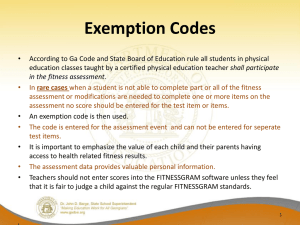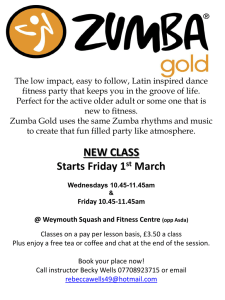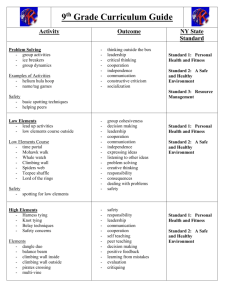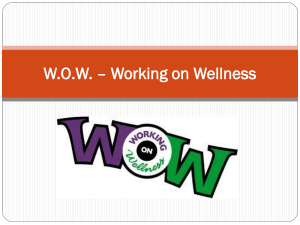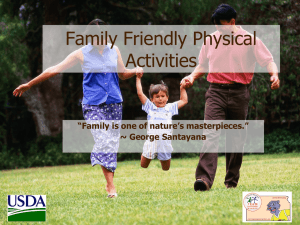Health, Physical Education, and Recreation
advertisement
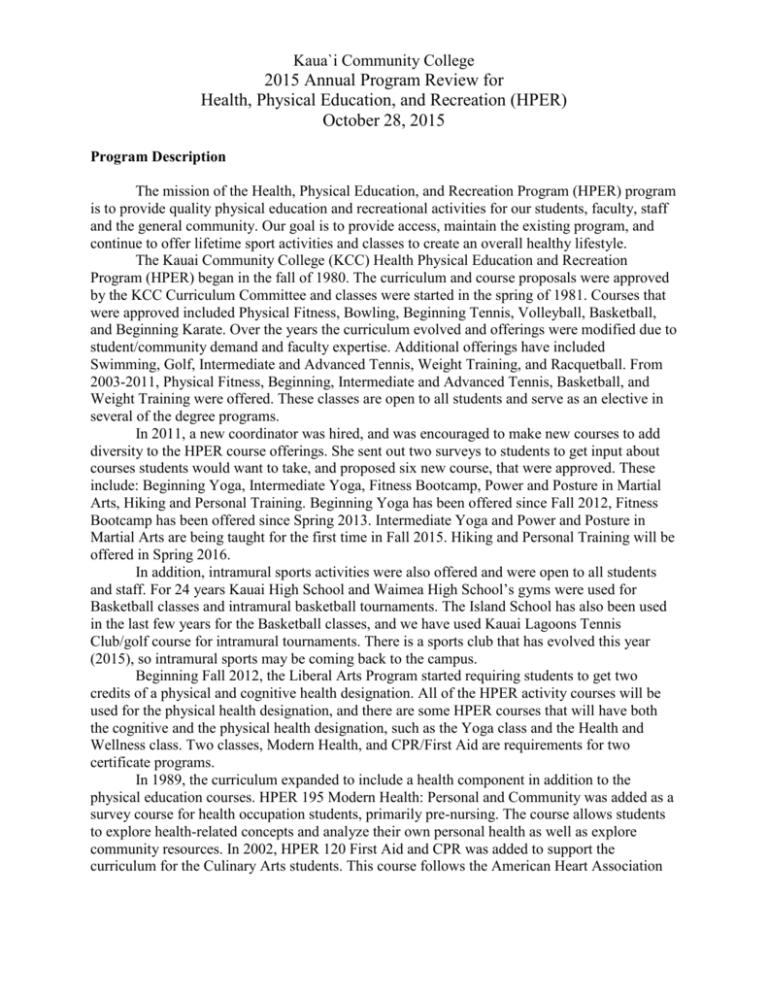
Kaua`i Community College 2015 Annual Program Review for Health, Physical Education, and Recreation (HPER) October 28, 2015 Program Description The mission of the Health, Physical Education, and Recreation Program (HPER) program is to provide quality physical education and recreational activities for our students, faculty, staff and the general community. Our goal is to provide access, maintain the existing program, and continue to offer lifetime sport activities and classes to create an overall healthy lifestyle. The Kauai Community College (KCC) Health Physical Education and Recreation Program (HPER) began in the fall of 1980. The curriculum and course proposals were approved by the KCC Curriculum Committee and classes were started in the spring of 1981. Courses that were approved included Physical Fitness, Bowling, Beginning Tennis, Volleyball, Basketball, and Beginning Karate. Over the years the curriculum evolved and offerings were modified due to student/community demand and faculty expertise. Additional offerings have included Swimming, Golf, Intermediate and Advanced Tennis, Weight Training, and Racquetball. From 2003-2011, Physical Fitness, Beginning, Intermediate and Advanced Tennis, Basketball, and Weight Training were offered. These classes are open to all students and serve as an elective in several of the degree programs. In 2011, a new coordinator was hired, and was encouraged to make new courses to add diversity to the HPER course offerings. She sent out two surveys to students to get input about courses students would want to take, and proposed six new course, that were approved. These include: Beginning Yoga, Intermediate Yoga, Fitness Bootcamp, Power and Posture in Martial Arts, Hiking and Personal Training. Beginning Yoga has been offered since Fall 2012, Fitness Bootcamp has been offered since Spring 2013. Intermediate Yoga and Power and Posture in Martial Arts are being taught for the first time in Fall 2015. Hiking and Personal Training will be offered in Spring 2016. In addition, intramural sports activities were also offered and were open to all students and staff. For 24 years Kauai High School and Waimea High School’s gyms were used for Basketball classes and intramural basketball tournaments. The Island School has also been used in the last few years for the Basketball classes, and we have used Kauai Lagoons Tennis Club/golf course for intramural tournaments. There is a sports club that has evolved this year (2015), so intramural sports may be coming back to the campus. Beginning Fall 2012, the Liberal Arts Program started requiring students to get two credits of a physical and cognitive health designation. All of the HPER activity courses will be used for the physical health designation, and there are some HPER courses that will have both the cognitive and the physical health designation, such as the Yoga class and the Health and Wellness class. Two classes, Modern Health, and CPR/First Aid are requirements for two certificate programs. In 1989, the curriculum expanded to include a health component in addition to the physical education courses. HPER 195 Modern Health: Personal and Community was added as a survey course for health occupation students, primarily pre-nursing. The course allows students to explore health-related concepts and analyze their own personal health as well as explore community resources. In 2002, HPER 120 First Aid and CPR was added to support the curriculum for the Culinary Arts students. This course follows the American Heart Association standards and the students are certified in both areas. Both of these courses were conducted by nursing faculty. Part 1 – Quantitative Indicators FILL RATES FOR HPER COURSES Actual Enrollment/Maximum Enrollment Course Title HPER 100 Health, Wellness, & Fitness HPER 108 Beginning Yoga HPER 130 Beginning Tennis 88% 88% HPER 131 Intermediate Tennis 56% 75% HPER 132 Advanced Tennis 81% 88% 81% HPER 137 Basketball 52% 84% 68% HPER 152 Weight Training 104% 108% 117% HPER 160 Fitness Bootcamp HPER 170 Intermediate Yoga HPER 195 Modern Health Posture and Power in Martial Arts HPER 197 F10 S11 Queried: 10/2015 F15 3 year 5 year 67% 50% 40% 47% 19% 45% 45% 63% 25% 81% 89% 92% 81% 94% 88% 88% 74% 63% 63% 100% 31% 54% 13% 66% 75% 83% 60% 64% 72% 52% 28% 55% 88% 79% 67% 92% 50% 66% 75% 84% 42% 100% 79% 78% 103% 75% 80% 80% 25% 25% 25% 79% Fill rates greater than 100% are the result of capacity overrides. Tables: IRO_SOCEX_UH 88% S14 F14 S15 S12 F12 S13 F13 92% Enrollments taken at census date (Fifth Friday after instruction begins). Source: Banner Operational Data Store F11 60% 79% 56% 56% 56% HPER Review – Fall 2015 Demand Indicators SSH in All Program Classes FTE Enrollment in Program Classes Total Number of Classes Taught Efficiency Indicators Average Class Size Fill Rate FTE BOR Appointed Faculty Analytic FTE Faculty Number of Low-Enrolled (<10) Classes Effectiveness Indicators Success Rate (Grade of A, B, C, or CR) Withdrawals (Grade = W) Persistence in HPER (Fall to Spring) Persistence in HPER (Fall to Fall)) Persistence at Kaua‘i CC (Fall to Spring) Persistence at Kaua‘i CC (Fall to Fall)) 07-08 221 7.4 16 08-09 148 4.9 12 09-10 183 6.1 13 10-11 197 6.6 12 11-12 59 2.0 8 12-13 253 8.4 14 13-14 261 8.0 10 14-15 166 7.6 9 07-08 12.0 71% 1 0.7 4 08-09 12.1 76% 1 0.5 3 09-10 12.6 75% 1 0.5 1 10-11 14.8 88% 1 0.5 0 11-12 7.4 53% 1 0.3 4 12-13 12.9 74% 1 0.7 2 13-14 10.6 62% 1 1.1 5 14-15 9.3 55% 1 .96 8 07-08 87% 4 35% 31% 65% 47% 08-09 92% 3 53% 31% 75% 50% 09-10 96% 0 48% 34% 82% 54% 10-11 95% 5 37% 11% 72% 37% 11-12 60% 6 13% 3% 47% 26% 12-13 76% 13 30% 15% 72% 49% 13-14 69% 14-15 72% 10 16.3% 7.5% 67.5% 48.8% 8 23.8% 10.0% 71% 45.0% All indicators were calculated using the definitions from the UHCC Annual Reports of Program Data (www.hawaii.edu/offices/cc/arpd), except for Persistence, which is calculated for persistence within HPER (i.e. taking another HPER course) and separately for persistence at the college. Kaua‘i Community College Office of Institutional Research 10/23/2015 Part II. Analysis of the Program – 2014/2015 The Persistence numbers would be something to evaluate in the future, but since HPER courses have primarily been electives, enrollment in those courses is based on the student’s load in other classes. With the Health designation being implemented for the Liberal Arts program, the numbers may change. The following HPER courses: Basketball, Beginning, Intermediate, and Advanced Tennis have been the only activity courses offered from 1981-2011, with Weight Training being offered from 2003 to current. From 2011- currently, new courses have been proposed and are being taught or will be in the Spring semester. The persistence may change with the new courses. Also, the Liberal Arts program is now requiring their students to take one credit of a physical health designation and one credit with a cognitive health designation as of Fall 2012. All HPER courses will apply to the physical health designation, with a few courses that will have both the physical and cognitive designation, such as the Beginning Yoga, Intermediate Yoga, and the Health, Wellness and Fitness class. The Beginning Yoga course has been consistently in high demand with Fitness Bootcamp coming in second to the demand. Development of new courses was based on two student-driven surveys of courses they would be interested in taking. From the survey given to the students in the Fall 2012 HPER courses, the following activities were ones students were interested in taking if offered as HPER courses: Swimming for Fitness, Surfing, Intermediate Weight Training, Intermediate Yoga, Hiking, Jogging for Fitness, Karate, Cycling, Fitness Boot Camp Training, Volleyball, and Triathlon Training. Beginning Yoga had already been proposed, but students were also interested in Intermediate Yoga, as well. The next courses that have been developed were: Fitness Bootcamp, Power and Posture in Martial Arts, Intermediate Yoga, Hiking, and Personal Training. Swimming for Fitness may also be a course that will be reactivated. The Tennis classes have waned, and had a dip of attendance over a few semesters. However, it surged with a full class during Spring 2015. However, the tennis courses have moved to OCET. Strengths The current HPER instructor is a Registered Yoga Teacher, and has developed both Beginning and Intermediate Yoga. Other courses that will be proposed in the future that she can teach include Jogging for Fitness, Walking for Fitness, Weight Control, Triathlon Training, Intermediate Weight Training, and Volleyball. With the current HPER instructor’s experience, KCC will be able to expand their HPER course offerings and provide more opportunities for students to learn a new skill, improve their fitness level, and manage their stress level. The current instructor not only teaches the skills, but provides tools that students can use after the semester is over to continue a lifetime of wellness. Weaknesses Health, Wellness, and Fitness, HPER 100 has been struggling since it started in Fall 2013, with a 3-year fill rate of 45%. Basketball, HPER 137is also struggling with a 3-year fill rate of 55%. There have been adjunct instructors for this class, and with the 2nd adjunct, the numbers really went down. The three-year Fill Rates indicate HPER 108 Beginning Yoga is 88%, HPER 160 Fitness Bootcamp is 80%, HPER 152 Weight Training is 75%, HPER 130 Beginning Tennis is 74%, HPER 197 Power and Posture in Martial Arts is new this semester and the fill rate is 56% and Intermediate Yoga is also new this semester and the fill rate is 25%. Data shows that there hasn’t been a lot of variety in the activity courses that were offered at KCC. There are only five activity courses that have been available for students. Beginning Tennis has been offered since 1981, Intermediate Tennis since 1982, Advanced Tennis since 1988, Basketball since 1986, and Weight Training since 2003. There have been a few other courses that were taught, but only for a few semesters, such as Bowling, Golf, Karate, Physical Fitness, Volleyball, and First Aid/CPR. By changing the course offerings in the HPER division, perhaps more students will be reached. The new HPER instructor has responsibilities to revive the Faculty and Staff Wellness Program. In the first year of offering, 2008/09, there were teams across campus that were competing and in charge of a monthly activity, which included ballroom dancing, weight room activities, walking, and line dancing. In 2009/10, there were activities, but the team concept was dropped. In 2010/11, there was a dramatic decrease in wellness programs and participants. The Wellness committee did not meet regularly. In 2011/12, the new HPER instructor provided fitness testing and 20 faculty/staff participated. The weight room was open for afternoon usage for faculty/staff and students. The Wellness committee met twice each semester. A survey was dispersed to faculty and staff to find out their interests. From 2012 on, Fitness Bootcamp has been offered on Monday/Wednesday during one semester, and the following semester rotated to Tuesday/Thursday. Since the start, it is also offered on Fridays as an additional workout day, that a few faculty/students take advantage of. During Spring 2015, over 113 faculty, staff, and students participated in a campus-wide wellness challenge called Active for Life. It was a 10week challenge that participants could set their own goal. Also, during this time, we had a Healthy Eating Series, that focused on easy recipes to sample and take the recipe home to try. The current facilities available for Health and Physical Education courses are four tennis courts and a weight room. We do not have an enclosed space dedicated to fitness activities. There are no bathroom or shower facilities at the areas of fitness. The weight room is limited in space and is not large enough for the students to lift using free weights. There is not room currently for a squat rack, but if we could expand the weight room on the free weight side of the room, we could get a squat rack and actually have adequate room to lift. Currently, the closest restrooms from the tennis courts/weight room are at the Campus Center or the Welding building. Without a restroom facility near the weight room or tennis courts and with the nearest restroom sometimes closed, students and faculty/staff have had to change clothes in the weight room or a storage closet on the courts. Dressing in the storage closet on the tennis courts or in the weight room is not ideal or appropriate. Some students have had stomach issues during class, and barely made it to the closest bathroom. When I asked Calvin Shirai about an estimated cost for adding a bathroom/shower facility and adding on to the weight room, he estimated $100,000 for each part. He said that the sewage pipes closest to the weight room were at the front of the Campus Center, which made me think about other possibilities. If we were to build a larger weight room attached to the campus center, that would be closer to the sewage pipes, so maybe the cost wouldn’t be as high. The current weight room could be used as a HPER classroom, to use for such classes as Beginning Yoga. Beginning Yoga has been in Health Sciences #124 and now in the Elections Building. In both places, we have to put up the tables and chairs for each class and take them down to practice. It would send out an affirming message to students and the community at KCC if we were to actually have a building or large activity center dedicated to the health and wellbeing of the students and faculty/staff. If we had a large activity center, we could have the basketball class on campus instead of going to one of the high schools. And, with the addition of the two credit hours of cognitive and physical health required for the Liberal Arts program, we could offer more classes with added facility space. When asked by the Health Education Coordinator at the Health Department if we had a gym so that we could be a site for a community fitness program, she was shocked that KCC didn’t have a gym. Without a wide open space and storage facilities, KCC would not be a good site for this community fitness program. If we had our own gym, we would not have to use Waimea, Kapaa or Island High School for Basketball classes. A method of increasing the wellness of the KCC community would be to utilize the space around campus and purchase outdoor fitness equipment. It could be utilized at any time. Students, faculty, staff, community members could utilize the equipment in between classes, on the weekend, and a building would not have to be opened. It could be used by the Fitness Boot Camp class and other HPER courses. Significant Program Actions 1. Revive Wellness Program From Fall 2012 to currently, Fitness Bootcamp has addressed many of the activities that faculty and staff wanted to participate in: weight lifting, yoga, walking/jogging, core strengthening, and team games. The total number of faculty and staff who have taken Fitness Bootcamp in the last six semesters is 22, with 12 taking the course more than once. During Spring 2014 and 2015, and Fall 2015, there have been two nutritional education opportunities for faculty and staff: an online program called the Full Plate Diet with 8 lessons, and the Healthy Eating Series.We have had two speakers to come do a presentation on campus about Ayurvedic Medicine and Aromatherapy. These were two of the interest areas for the faculty and staff. In Spring 2016, I hope to do one Lunch and Learn about Personality Styles and Communicate Better. Part III. Action Plan Goal Alignment UH System Goals, Kaua‘i Community College Goals, and Strategic Goals UH Goal 1: Educational Effectiveness and Student Success KCC Goal 1: Access & KCC Goal 2: Learning and Teaching Strategic Goals: Student Recruitment, Retention and Success of All Students and Particularly o Remedial/Developmental Students o Non-traditional Students in Career and Technical Programs o Increased Completion of Degrees, Certificates, and Licensure o Increased Transfer Rate o Increase opportunities for potential students to experience KCC Relevant Curriculum Development o Sustainability/Green Jobs o Health o STEM o DOE-KCC English Alignment o Distance Education o Create/Strengthen k-12 - four-year degree pathways Completion of o Course Student Learning Outcomes (CLOs) o Program Learning Outcomes (PLOs) o Institutional Learning Outcomes (ILOs) o Course Action Forms (CAFs) Assessment Activities and Analysis UH Goal 2: A Learning, Research and Service Network KCC Goal 3: Workforce Development & KCC Goal 5: Community Development Strategic Goals: Increased Job Placement and/or Performance through o Revised or New Curriculum o Better Coordination with Business and Industry UH Goal 3: A Model Local, Regional and Global University KCC Goal 6 Diversity Strategic Goals: o Fostering Global Understanding and Intercultural Competence Program Goals 1. Provide a variety of HPER course offerings in order to appeal to the needs of the greatest number of students, faculty, and staff. 2. Assess and update the class offerings as needed to meet student demands. UH System Goals, Kaua‘i Community College Goals, and Strategic Goals o Program Goals Increased Enrollment and Success of International Students UH Goal 4: Investment in Faculty, Staff, Students and Their Environment KCC Goal 4: Personal Development Strategic Goals: o Professional Development Directed to Any of the Above Goals o Enriching Student Experience, Particularly Directed to Any of the Above Goals o Increasing the Efficiency, Effectiveness and Sustainability of the KCC Environment UH Goal 5: Resources and Stewardship KCC Goal 5 Community Development Strategic Goals: o Reduce Deferred Maintenance o Address Health and Safety Issues o Promote Sustainability 3. 3. Provide a safe environment for learning by updating and maintaining equipment and facilities. 4. Offer activities which will promote wellness and fitness to the KCC campus. Provide a safe environment for learning by updating and maintaining equipment and facilities. Action Plan(s) Program Goal 1. Provide a variety of HPER course offerings in order to appeal to the needs of the greatest number of students, faculty, and staff. 2. Assess and update the class offerings as needed to meet student demands. 3. Provide a safe environment for learning by updating and maintaining equipment and facilities. 4. Offer activities that will promote the health and wellness of the KCC campus. Action Item Review Enrollment Data, Did a Student Activity Survey Fall 2012 with current HPER students. Sent a 2nd Student Survey in Fall 13 to update courses to propose. Review Enrollment Data, Did a Student Activity Survey Fall 2012 with current HPER students and in Fall 2013 Will use the HPER money to offset the cost. Have asked Student Government, the Chancellor, and HED Division if they can help contribute funds. HED could not, but Student Government and the Chancellor said she could help. Seek grants to purchase new equipment, Resources Needed Enrollment Data, Faculty/Staff Wellness Survey, Student Activity Survey Enrollment Data, Student Activity Survey for whole student body. Person(s) Responsible Program Coordinator Program Coordinator Timeline Annually (see attached excel spreadsheet for details) Program Coordinator PLO impacted Status Make informed decisions based on an understanding of the qualities of a healthful lifestyle, explain the connection between a healthy body and a thoughtful mind, perform group activities cooperatively, and engage in healthful physical activity. Enrollment was reviewed for the past three years. Classes continue to be in high demand. Six new courses have been developed, with the last two being offered in Spring 2016. Six courses have been proposed since 2011 and all but two have been offered. The Intramural Sports Fund has monies to help offset the total cost of the outdoor fitness circuit. Fall 2012 –Spring 2016 Offer 6 new courses by Spring 2016. Make informed decisions based on an understanding of the qualities of a healthful lifestyle, explain the connection between a healthy body and a thoughtful mind, perform group activities cooperatively, and engage in healthful physical activity. Ongoing Have not pursued grant writing, however, I have talked with HED division, Student Government, and the Chancellor about donating funds to the outdoor fitness circuit. HED could not help, Student Government and the Chancellor said they would contribute funds to the outdoor fitness circuit. Make informed decisions based on an understanding of the qualities of a healthful lifestyle, explain the connection between a healthy body and a thoughtful mind, perform group activities cooperatively, and engage in healthful physical activity. Priority 1) Purchase outdoor fitness circuit equipment for wellness of KCC community. Wish List 2) Add on to the weight room to increase space, and add bathroom and shower facilities. Indicator of Improvement The Fill Rate will increase from the current 56% to above 70%. There has been a variety of new courses proposed and implemented, including Beginning Yoga, Intermediate Yoga, Fitness Bootcamp, and Power and Posture in Martial Arts, with Hiking and Personal Training being taught Spring 2016. Total Cost Equipment Concrete Slab Shipping 9 pcs = $29,500 Cost? approx. $2,100 Money Available for this Purchase HPER Monies $23,000 Student Government will help Chancellor will help Justin Carvalho said that Carpentry could help with the installation, but I would need to purchase the concrete Besides the $23,000, I will need $10,000-$15,000. Outdoor Fitness Equipment Tri Active America - E-line Products www.SkyShadesHawaii.com 10-year warranty Equipment E-Line Air Walker E-Line Back Extension E-Line Elliptical Cross Trainer E-Line Double Leg Press E-Line Pull UP and Dip Station E-Line Rowing Machine E-Line Seated Chest Press E-Line Sit Up Board E-Line Seated Lat Pull Cost $29,500 w/o S&H Approx. Cost of Shipping 2 Pallets to Kauai $2,100 Greenfields Outdoor Fitness Equipment - Santa Ana, California www.greenfieldsfitness.com Equipment Options Comes with 10 year warranty Option 1 Lat Pulldown, Shoulder Press Multi-Level Bars Pendulum Abs, Dips, Pullups 2-Person Cross Country Ski 2- Person Chest Press Rowing Machine 4-Person Leg Press Single Person Eliptical Situp Benches Air Walker Cost w/o S&H Option 2 Back and Arms Two Person Chest Press Cost w/o S&H $31,000 $33,000 Two Person Lat Pulldown Three-Person Static Combo Two-Person Leg Press Two-Person Incline Situp Stairclimber or Eliptical? Pro-Adjustable Squat Pro-Adjustable Seated Chest Press Pro-Adjustable Leg Ext/Leg Curl Option 3 Adjustable Leg Press Adjustable Squat Sit Up Bench Adjustable Chest Press Adjustable Rower Stepper Tricep Press Cost w/o S&H Multiple Level Bars


